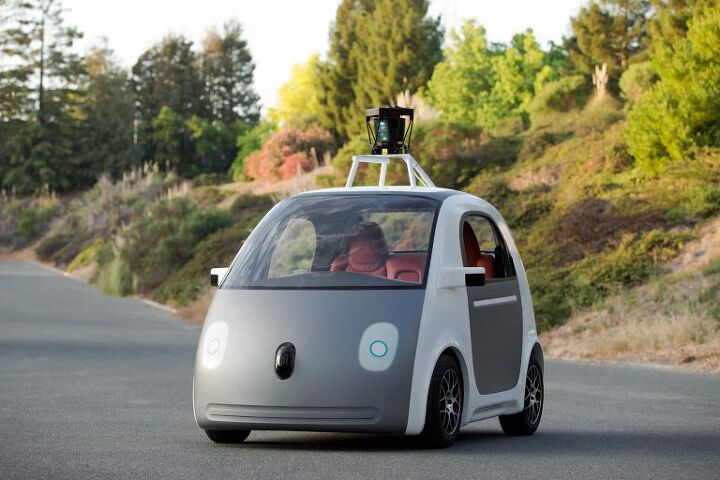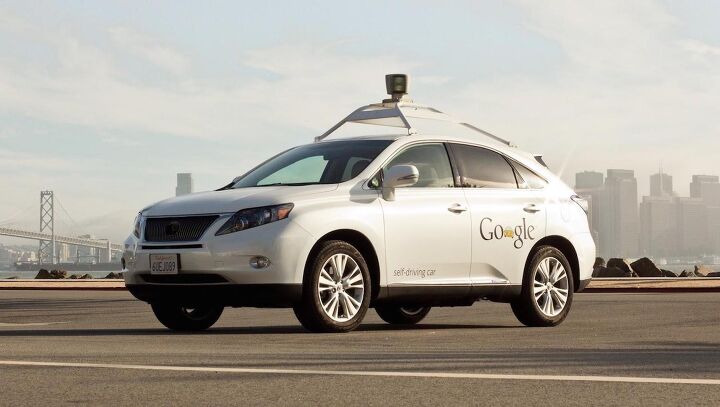#GoogleCar
Google Car Staffers Enriched Themselves by Giving Their Boss the Finger
Take the money and run, Steve Miller once said, and boy, did employees at Google’s self-driving car project take that advice to heart.
According to a Bloomberg report, the financial incentive to leave the project and hit the bricks was so great, many realized they couldn’t afford not to quit. And, in the grand tradition of pulling up employment stakes, many enjoyed the fact that their departure cost the company big, big bucks.
In many cases, those employees used the money to become Google competitors.
What the Hell is Happening With Google's Autonomous Car?
Technology companies need to stop attempting to build cars. This is all getting too convoluted.
Despite working at it longer than anyone else, Google appeared to be pulling out of the race to be the first tech company to produce an autonomous electric vehicle — a familiar fate for those who foray into the automotive world without a surfeit of experience. Apple’s Project Titan suffered a similar fate after multiple postponements to the vehicle’s intended release, strategy disagreements, large-scale layoffs, and the loss of key leadership assigned to the self-driving vehicle’s development.
Building a car is a serious undertaking, so it isn’t surprising that Google had to throw in the towel. The only problem is that, after quitting, Google announced that it was more committed to the goal of producing an autonomous vehicle than ever before.
Silicon Valley Discovers 'Making a Car is Hard'
Every now and then, a critical mass of clever, ambitious folks excited about a particularly good idea coalesces, often in a particular geographic region, and humanity gets lucky. The American colonies in the late 18th century and Detroit in the early 20th century are historical examples. Silicon Valley, starting in the 1980s, is probably our best contemporary example.
In recent years, those modern titans of technology have turned their futurist eyes towards personal transportation. Whether explicitly or in sotto voce tones, they’ve indicated that the traditional auto industry personified as “Detroit” was a dinosaur about to go extinct. Not knowing the auto industry metaphor of becoming an obsolete buggy whip manufacturer, the tech industry saw Detroit’s future as “making handsets” — i.e. low tech assemblers.
Tesla was going to show us the new electron driven future, Google was going to make cars that drove themselves, and the Apple of the tech world’s eye was going to do nothing less than completely reinvent the automobile, just as it had done with music players and telephones. The push towards self-driving, autonomous cars and trucks was only going to accelerate the ascendancy of Silicon Valley as the new Motor City.
Just because you’re good at one thing, however, doesn’t mean you’re good at another.
TTAC News Round-up: Toyota's a Big Tease, New Lada Savior, and Buick Puts the Avista Away Forever
Toyota is hoping to break the internet with an alluring butt shot of an upcoming Prius variant.
That, a new guy will turn around Lada (again), Buick says you’ll never drive an Avista, the second GM ignition trial begins, and Google’s got its eye out for buses … after the break!
Autonomous Vehicles, Malicious Drivers
You’ve probably heard the news: An autonomous Google-Lexus brushed a city bus at about 2 miles-per-hour. There’s been plenty of discussion on the incident, some of it oddly hysterical, but most of it has centered on the idea of the future capabilities of autonomous traffic to operate in traffic as it exists today. In other words, from everything I’ve read, the Google automotive team, and everybody else working on the autonomous-car problem, assumes that their cars will have to deal with the same conditions that you and I might face if we were behind the wheel of that automobile.
If that is truly the case, then autonomous vehicles are in for a rougher ride than anybody yet suspects, because they won’t have to deal with the same conditions that human drivers do. Their reality will be much, much worse.
Henry Blodget: Apple Won't Be the Next Porsche
Henry Blodget publishes Business Insider. Blodget is a former managing director of Merrill Lynch who rose to fame in the late 1990s on his timely and correct prediction that Amazon stock would reach $400, then lost his $12 million/year job following the burst of the dot.com bubble, and then was permanently barred by the Securities and Exchange Commission over fraud allegations*. Blodget still has outstanding sources and contacts within the tech sector. In a post at his website, Blodget discusses the current excitement about tech companies like Google and Apple exploring automotive ventures, which some say are aiming at becoming the next Dr. Ing. h.c. F. Porsche AG. Not only does he say that the tech sector is cyclical, that the current bubble will also eventually burst and that Apple’s outsized success with their smartphones has been anomalous even for that now routinely successful firm, he makes some sound arguments the next Porsche AG is not likely to come from the Silicon Valley.





















Recent Comments